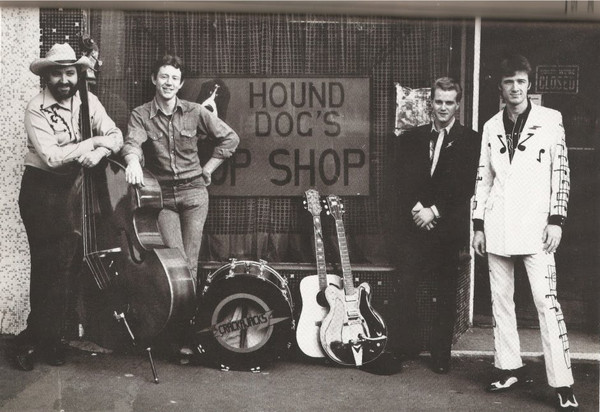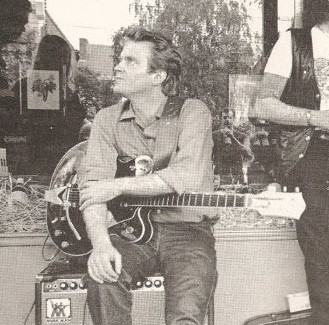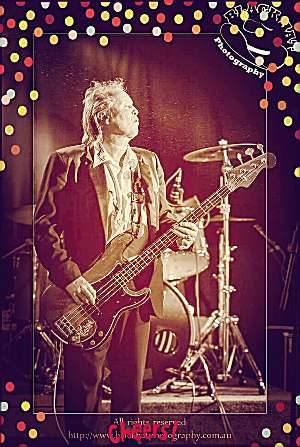
Crackajacks
Band, AU
Rock and Pop
At the height of punk/new wave mania (admittedly still an underground phenomenon) The Crackajacks tore on to the inner city Melbourne scene like a cyclone in late 1979. As a group of young guns formed specifically to play the music of the original rockabilly cats, and the more obscure examples at that, they were unprecedented in Australian terms and pretty close to being the purist specimens of an embryonic rockabilly revival worldwide. Pure in the sense that they were delving deep into a generation past, using the hepped up southern boys who had dive bombed back into obscurity as their template. At the time the proliferation of golden era rockabilly releases now available was a mere trickle, the music for all intent dead and buried despite the occasional commercial flare-up of a Major Matchbox, Shakin' Stevens or Queen's "Crazy Little Thing Called Love". The above were like approximations of the era, The Crackajacks delved deeper. Primarily though guitarist Warren Rough, already a veteran of the 'ockabilly' outfit The Autodrifters and their inspirational sorties to Hound Dog's Bop Shop, (a West Melbourne Oldies record shop without equal anywhere in the world), the members and particularly Rough became well versed in rockabilly folklore. The other original members were Charlie Paine on bass and Mick Lyon/Black on drums with the enigmatic Rick Newton becoming the perfect real gone focal frontman. Things moved fast in those days and Au-Go Go Records and Missing Link, working in tandem, were standing by to jump on anything with a street credibility pulse to put on a 45 rpm single. So it happened that The Crackajacks, mere months after their first real gigs, were hustled into a small backyard studio to record. I was on hand that day and the results were less than sensational and haven't (as far as I know) survived to prove any different. A few weeks later however, at the larger York Street Studio under the hand of engineer David "Daffy' Williams, the group laid down an absolute powerhouse rendition of "Long Blond Hair" and a pretty fine "Stranger Than Fiction". "Long Blond Hair" was a classic in it's original form by Johnny Powers who had also been known in Australia, (probably due to the whim of the legendary Lee Gordon and his Leedon label) as Johnny "Scat" Brown while "Stranger Than Fiction" sprung from the mind of "Groovey" Joe Poovey, an equally potent rockabilly original. With the singles release in March 1980, it became Au Go Go's biggest seller with rave reviews at home and abroad. Newton opined at the time "It'll be hard to find a follow-up" - time has proven him right. What the band did with these two fairly obscure songs was to create a synthesis into the excitement of their own era. When The Stray Cats came along not long after that transformation was complete - it was rockabilly with a new wave punk attitude. So it came to pass that "Long Blond Hair" became both the band's anthem and albatross. A deal was fixed up for a 'real' record company Astor to take on the single and try and break it to a larger market but mainstream radio proved resistant. Astor lost interest in taking up their option on an album being funded by Missing Link, partly as sale of the company was pending to the multi-national Polygram anyway. Subsequently the single was issued for a third time under a new deal Missing Link made with the larger indie Powderworks and their distributor RCA. This new release at least found a fresh flip side for the single and was supported by a video clip, nonetheless one reviewer remarked "this song has been around so long the girl in question must have gone grey by now". Changes in line-up found Peter Patter coming in towards the album's completion, although by the time it was released, Jack Cracka held down the bass slot. At last with an album ready, a new single was released. "Can't Do Without You" b/w "Go Cat Go" . It was a solid effort that lacked the flair of "LBH" - if the latter had failed to ignite the larger world what hope this? Adding to the problems were the distribution woes of Powderworks who had decided to set up their own Australia-wide independent network. Missing Link and The Crackajacks album was caught in the middle of the change and in truth, the momentum of the band had dissipated. Also not helping the situation was a lovingly crafted but unexciting album cover by artist Jeff Fisher and the decision to NOT include the original version of "LBH" on the album, rather a tricked up studio mix. How many copies of "Little Heart Attacks" escaped is a matter for conjecture, no real royalty statements ever came from Powderworks to clear that mystery up. The band continued to perform, adding and subtracting a few members here and there, even coming back for a revival tour in 1989, by which point Newton was Rick O'Shea (having fronted a more countrified outfit called "The Crummy Cowboys" for a few years) and Rough a veteran of more rootsy outfits, notably The Paramount Trio with whom he continues to this day.
Members
 | Rick Newton voc |
 | Warren Rough g AU |
 | Jim Niven key, voc, p AU |
 | Rick Dempster stg, voc, h |
 | Mick Black dr, voc |
 | Charlie Paine b |
 | Peter Patter eb |
 | The Jackettes bvoc |
Discography
| Title | Artist | Year | Type |
|---|---|---|---|
| Little Heart Attacks | Crackajacks | 1981 | Album |
| Can't Do Without You | Crackajacks | 1981 | Single |
| Long Blond Hair / Stranger Than Fiction | Crackajacks | 1980 | Single |
| Rockabilly Ricochet! | Crackajacks | Compil. |
